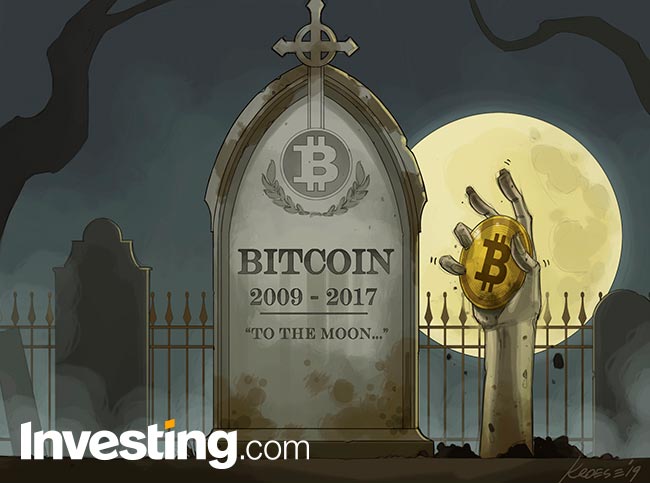Investing.com - You love it or you hate it: the Bitcoin. While the enthusiasts rave about an alternative currency system that is neither controlled by a government nor by a central bank, the opponents speak of a worthless speculative object that will never be able to replace the established financial system.
Crypto advocates repeatedly point to the ailing Fiat-System, in which new notes are constantly printed, causing currencies like the dollar and the euro to continually lose value.
They argue that this cannot happen with bitcoin, which is limited to 21 million pieces. But it is this supposed advantage that will be its undoing. If Fiat currencies go under, as the Bitcoin maximalists hope, then at the latest the last hour will have struck for the BTC.
Alasdair Macleod proved in his recent article that bitcoin will never be used as a means of payment by the masses. This does not mean that the value of the BTC, measured in fiat currencies, will not temporarily rise as confidence in fiat currencies declines.
But ultimately it fails just the same and does not become the success story that many dream of. Dreams that mainly the hodlers cherish while they guard their BTC holdings like treasure. And it is at this point that the first serious problem arises.
A means of payment is needed to buy and sell goods and services. But if no one wants to wake up from their nice dream and spend the hoarded BTC, then they will not be available to the economy. The resulting liquidity crisis would be fatal.
Macleod explains that while the increase in value would please the hodlers, the price of products in BTC would fall so rapidly that trade would grind to a halt because people would only buy the bare necessities. A world in which bitcoin replaces fiat currencies as a means of payment would inevitably lead to mass poverty.
Another problem is that any monetary system goes hand in hand with a functioning credit economy. For industrial production, factories have to be built, while progress is based on costly developments and research, which is often only possible with credit.
Before any economic venture, an entrepreneur must know the profitability. This includes input costs as well as the final sales value of the product. But if no one knows how much the value of bitcoin will increase, then it is almost impossible to determine the profitability of a loan and assess the risk involved. No one would make any more investments in the real economy.
Bitcoin cannot provide the functions essential for a means of payment, which, according to Macleod, none of the BTC advocates seem to be aware of. However, it is not only the practical use cases that the cryptocurrency cannot cope with, but also legal aspects that speak against the BTC being able to replace fiat currencies.
It is about ownership and property, which are by no means two words for one and the same thing.
If you lend a book to a friend, the book becomes the friend's property but remains yours. If you pay a visit to your friend and he is not at home, but you see the book lying on the porch, then you can simply take it with you because you are still the owner.
It is completely different if you lend 100 euros to your friend. Because with money and consumer goods like food and drink, there is always a transfer of ownership. Legally, you only have an outstanding claim.
If you go to your friend's house again and don't meet him, but see his wallet lying on the porch and take the 100 euros from it, this is theft.
Similarly, as Macleod writes, criminal activity is very important, especially in the context of Bitcoin scam, money laundering, etc.
If your car is stolen and the thief sells it, you are still the owner and do not have to compensate the bona fide buyer. The latter remains on the hook for the damage.
However, if money is stolen from you by a pickpocket or your bank account is hacked, then you only have a right of recourse against the thief - your ownership rights are extinguished.
Unlike banknotes, a Bitcoin can be clearly assigned to an owner via the blockchain. But this strength turns out to be a serious disadvantage in our legal system.
If you buy a Bitcoin that is demonstrably linked to a criminal act, then ownership of that BTC was never transferred to you and you face confiscation without any compensation for damages.
Fiat currencies do have a growing trust problem, but who is to trust a means of payment that you never know if you really have ownership of?
The idea that cryptocurrencies can replace fiat currencies is rooted in the fact that no one has really understood that there is a difference between money and credit.
Macleod points out that notes issued by central banks are not money, but credit with counterparty risk. And because bitcoin is not eligible for a functioning credit economy for the reasons mentioned, it will never be able to replace dollars, euros and yen.
Real money only exists in the form of coins minted in Gold, Silber and Kupfer. Only these are not subject to counterparty risk.
Bitcoin is therefore neither money nor an adequate means of payment to replace fiat currencies. It is merely a blockchain - an innovative technology used to store information.
Therefore, bitcoin will go under if the concept of fiat currencies and central bank digital currencies (CBDCs) fails, Macleod concludes.
Translated from German using DeepL
